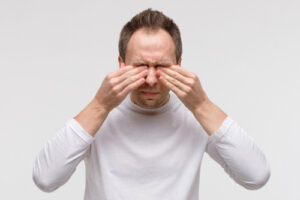Now that fall is here and the weather is starting to cool down, your eyes may feel drier or more irritated than usual. This is the perfect time to start thinking about how to keep your eyes healthy as the season changes.
During the warmer summer months, you may not think about how to keep your eyes healthy, especially when you’re spending more time outdoors in the sun. But no matter what time of year it is, having healthy eyes is essential any time of year. Keep reading for 7 tips for autumn eyecare and healthy eyes to follow this season!
1. Stay Hydrated
When you’re spending more time inside, you may find it’s easier to forget to drink enough water. But staying hydrated is vital for your health, especially your eyes.
You probably already know that not getting dehydrated is necessary if you want your body to work as it should. But the same is also true if you want your eyes to feel their best.
If your eyes feel dry, itchy, or gritty, these can be symptoms of a condition known as dry eye syndrome. Dry eye syndrome is a chronic condition that’s caused by one of two things: either poor tear production or the tears that you’re producing are low in quality.

If left untreated, dry eyes can increase your likelihood of developing eye infections, as well as lead to corneal ulcers, scratches on the cornea’s surface, and even vision loss. In addition to all this, having dry eyes is also extremely uncomfortable.
One way that you can keep your eyes from getting dehydrated is by drinking enough water. This can seem more difficult during the cooler months, but it’s necessary.
Some of the water content can come from other things like soup, smoothies, and even the foods you eat, but for the most impact, getting your eight glasses of water a day at a minimum is the best place to start for healthier eyes.
2. Limit Screen Time

Fall is the perfect time to curl up inside and watch a movie, especially when it comes to horror movies around Halloween! Occasionally relaxing in front of the TV isn’t bad, but too much screen time can be.
You should also consider how much time you spend on the computer. There’s no way to get around using them for work, but you don’t have to use them for hours on end without a break.
When you spend all day looking at a screen, spending most of your downtime on your phone or watching TV can start to take its toll on how your eyes function. Too much screen time can lead to Computer Vision Syndrome or CVS.
CVS is caused by overexposure to the blue light that digital devices like smartphones, tablets, and computers emit. Symptoms of CVS include headaches, dry eyes, and fatigue.
The best way to prevent and treat CVS is to limit your screen time. If you must use a computer for several hours at a time for work, use something called the 20-20-20 rule to give your eyes a much-needed break.
Every 20 minutes, take a 20-second break to look at an object at least 20 feet away. Practicing the 20-20-20 rule is an easy way to rest your eyes. You can also use this time to put in eye drops or artificial tears if your eyes feel dry or irritated.
3. Remember to Blink
No matter what you’re doing, don’t forget to blink. It may sound simple, but remembering to blink can be easier said than done.

Your blink rate decreases significantly when you’re looking at a screen or spending time in front of digital devices. You naturally blink when you’re doing most things, but you may have to actively remember to blink when you’re looking at a screen or doing something that requires a lot of focus.
For many people, this can result in feelings of dryness and discomfort. Remembering to blink when you’re concentrating can help keep your eyes moist and comfortable.
4. Be Careful Sitting Near Direct Heat Sources

Whether you’re sitting in front of a roaring fire or simply turning on your heat, be careful about sitting too close. Just like air conditioning blowing on your face can dry out your eyes, heat can do the same.
Make a conscious effort not to sit right under any vents, or if you’re sitting near a fire, put a little distance between yourself and the source of the warmth. Hot air from these heat sources can make your eyes feel dry, watery, and generally uncomfortable.
5. Consider a Humidifier

In the fall and winter months, you may notice that your home feels drier. One way to counter the effects of dry fall air and a lack of moisture is to have a humidifier in the rooms you spend the most time in, like your bedroom or living room.
Having a humidifier in your home can have various health benefits, like keeping your throat and sinuses from getting too dry. It can also make your eyes feel more moisturized and lubricated, which can be a plus for anyone who already has dry eye syndrome and its frustrating symptoms.
Colder weather can worsen these symptoms, so having a humidifier is an excellent way to avoid further discomfort.
6. Continue Wearing Sunglasses

It may seem like you should only wear sunglasses in the spring and summer, but the sun is always shining! Even when the weather is cooler, the sun is still out, and harmful UV rays in sunlight can damage your eyes.
Be sure to wear sunglasses when you’re outside, whether it’s sunny or cloudy, no matter what season it is. Only wear sunglasses that protect against 100% of UVA and UVB rays to ensure your eyes are not being harmed when you’re spending time outside.
7. Eat a Balanced Diet

Proper nutrition is one way to stay healthy. It’s also an excellent way to make sure you have healthy eyes.
There are many nutrients and vitamins that contribute to keeping your eyes healthy. Try incorporating foods like fish, seeds, nuts, dark leafy greens, beans, eggs, squash, and sweet potatoes into your diet, as they are good for your eyes!
Many of these foods are more popular in the fall, so it’s a great time to make delicious and nutritious dishes like butternut squash soup. Eating a balanced diet filled with fruits and vegetables also contributes to keeping your eyes healthier as you get older by lowering your risk for heart disease and diabetes, which can lead to eye conditions like age-related macular degeneration.
Looking for a place to start when it comes to keeping your eyes healthy this season? Schedule an appointment at Williamson Eye Center in Baton Rouge, LA, today!



